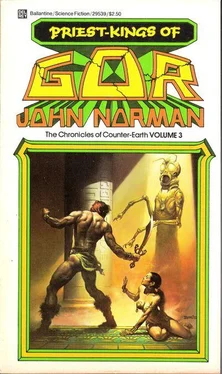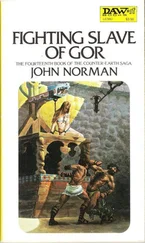“I am uneasy,” I said.
“I see,” said Misk, “you fear he is becoming a kind of machine.”
“Yes,” I said.
“You must remember,” said Misk, “that he is a Priest-King and thus a rational creature and that we could not turn him into a machine without neutralising certain critical and perceptive areas, without which he would no longer be a Priest-King.”
“But he would be a self-governing machine,” I said.
“We are all such machines,” said Misk, “with fewer or a greater number of random elements.” His antennae touched me.
“We do what we must,” he said, “ane the ultimate control is never in the mnemonic disk.”
“I do not know if these things are true,” I said.
“Nor do I,” said Misk. “It is a difficult and obscure matter.”
“And what do you do in the meantime?” I asked.
“Once,” said Misk, “we rejoiced and lived, but now though we remain young in body we are old in mind, and one wonders more often, from time to time, on the Pleasures of the Golden Beetle.”
“Do Priest-Kings believe in life after death?” I asked.
“Of course,” said Misk, “for after one dies the Nest continues.”
“No,” I said, “I mean individual life.”
“Consciousness,” said Misk, “seems to be a function of the ganglionic net.”
“I see,” I said. “And yet you say you are willing to, as you said, pass.”
“Of course,” said Misk. “I have lived. Now there must be others.”
I looked again at the young Priest-King lying on the stone table.
“Will he remember learning these things?” I asked.
“No,” said Misk, “for his external sensors are now being bypassed, but he will understand that he has learned things in this fashion for a mnemonic disk has been inscribed to that effect.”
“What is he being taught?” I asked.
“Basic information, as you might expect, pertains to language, mathematics, and the sciences, but he is also being taught the history and literature of Priest-Kings, Nest mores, social customs; mechanical, agricultural and husbanding procedures, and other types of information.”
“But will he continue to learn later?”
“Of course,” said Misk, “but he will build on a rather complete knowledge of what his ancestors have learned in the past. No time is wasted in consciously absorbing old information, and one’s time is thus released for the discovery of new information. When new information is discovered it is also included on mnemonic disks.”
“But what if the mnemonic disks contain some false information?” I asked.
“Undoubtedly they do,” said Misk, “but the disks are continually in the process of revision and are kept as current as possible.
Chapter Sixteen
THE PLOT OF MISK
I took my eyes from the young Priest-King and looked up at Misk. I could see the disklike eyes in that golden head above me and see the flicker of the blue torch on their myriad surfaces.
“I must tell you, Misk,” I said slowly, “that I came to the Sardar to slay Priest-Kings, to take vengeance for the destruction of my city and its people.”
I thought it only fair to let Misk know that I was no ally of his, that he should learn of my hatred for Priest-Kings and my determination to punish them, to the extent that it lay within my abilities, for the evil which they had done.
“No,” said Misk. “You have come to the Sardar to save the race of Priest-Kings.”
I looked at him dumbfounded.
“It is for that purpose that you were brought here,” said Misk.
“I came of my own free will!” I cried. “Because my city was destroyed!”
“That is why your city was destroyed,” said Misk, “that you would come to the Sardar.”
I turned away. Tears burned in my eyes and my body trembled.
I turned in rage on the tall, gentle creature who stood, unmoving, behind that strange table and that still form of the young Priest-King.
“If I had my sword,” I said, pointing to the young Priest – King, “I would kill it!”
“No, you would not,” said Misk, “and that is why you and not another were chosen to come to the Sardar.”
I rushed to the figure on the table, the torch held as though to strike it.
But I could not.
“You will not hurt it because it is innocent,” said Misk. “I know that.”
“How can you know that?”
“Because you are of the Cabots and we know them. For more than four hundred years we have known them, and since your birth we have watched you.”
“You killed my father!” I cried.
“No,” said Misk, “he is alive and so are others of your city, but they are scattered to the ends of Gor.”
“And Talena?”
“As far as we know she is still alive,” said Misk, “but we cannot scan her, or for others of Ko-ro-ba, without raising suspicion that we are solicitous for you – or are bargaining with you.”
“Why not simply bring me here?” I challenged. “Why destroy a city?”
“To conceal our motivation from Sarm,” said Misk.
“I don’t understand,” I said.
“Occasionally on Gor we destroy a city, selecting it by means of a random selection device. This teaches the lower orders the might of Priest-Kings and encourages them to keep our laws.”
“But what if the city has done no wrong?” I asked.
“So much the better,” said Misk, “for the Men below the Mountains are then confused and fear us even more – but the members of the Caste of Initiates, we have found, will produce an explanation of why the city was destroyed. They invent one and if it seems plausible they soon believe it. For example, we allowed them to suppose that it was through some fault of yours – disresepct for Priest-Kings as I recall – that your city was destroyed.”
“Why when first I came to Gor, more than seven years ago, did you not do this?” I asked.
“It was necessary to test you.”
“And the siege of Ar,” I asked, “and the Empire of Marlenus?”
“They provided a suitable test,” said Misk. “From Sarm’s point of view of course your utilisation there was simply to curtail the spread of the Empire of Ar, for we prefer humans to dwell in isolated communities. It is better for observing their variations, from the scientific point of view, and it is safer for us if they remain disunited, for being rational they might develop a science, and being subrational it might be dangerous for us and for themselves if they did so.”
“That is the reason then for your limitations of their weaponry and technology?”
“Of course,” said Misk, “but we have allowed them to develop in many areas – in medicine, for example, where something approximating the Stabilisation Serums has been independently developed.”
“What is that?” I asked.
“You have surely not failed to notice,” said Misk, “that though you came to the Counter-Earth more than seven years ago you have undergone no significant physical alteration in that time.”
“I have noticed,” I said, “and I wondered on this.”
“Of course,” said Misk, “their serums are not as effective as ours and sometimes do not function, and sometimes the effect wears off after only a few hundred years.”
“This was kind of you,” I said.
“Perhaps,” said Misk. “There is dispute on the matter.” He peered intently down at me. “On the whole,” he said, “we Priest-Kings do not interfere with the affairs of men. We leave them free to love and slay one another, which seems to be what they enjoy doing most.”
“But the Voyages of Acquisition?” I said.
“We keep in touch with the earth,” said Misk, “for it might, in time, become a threat to us and then we would have to limit it, or destroy it or leave the solar system.”
Читать дальше












